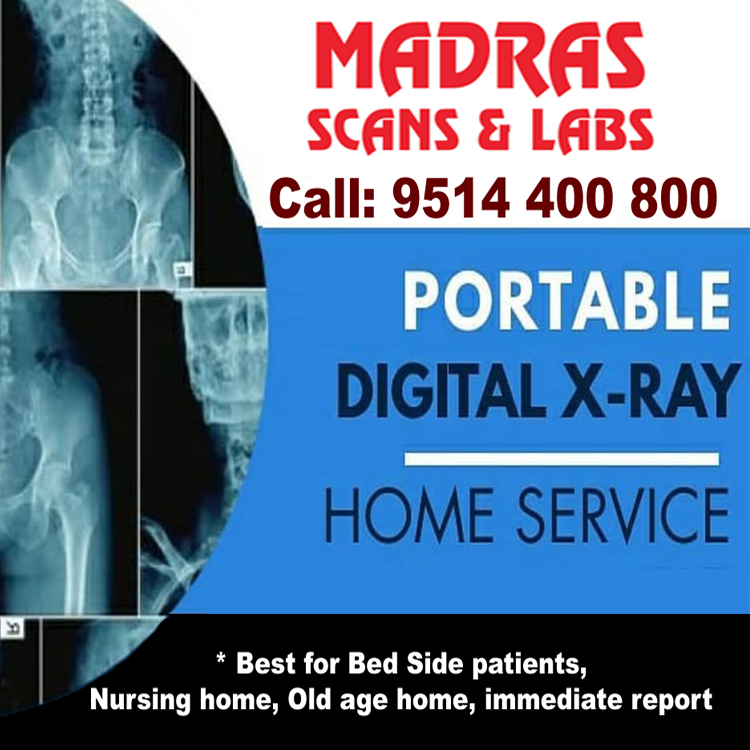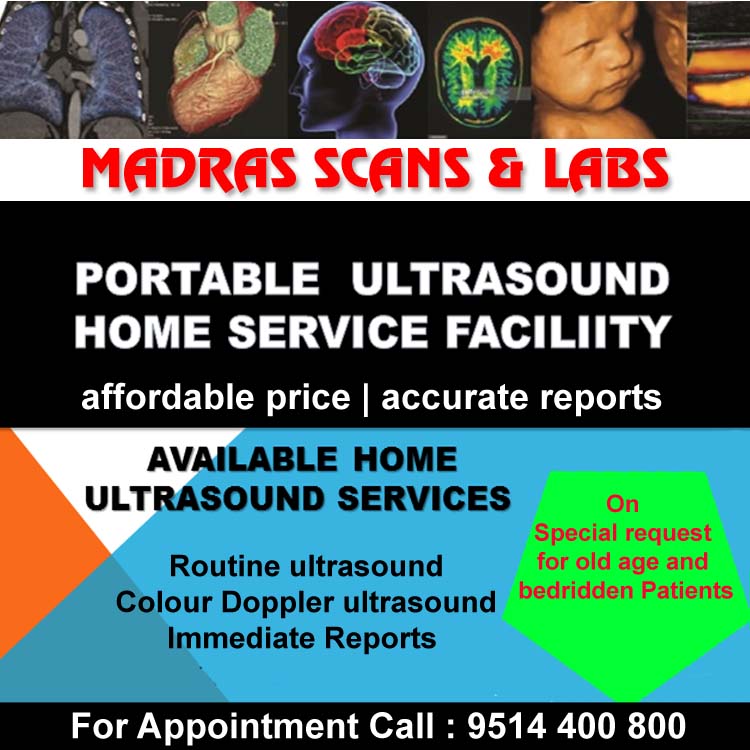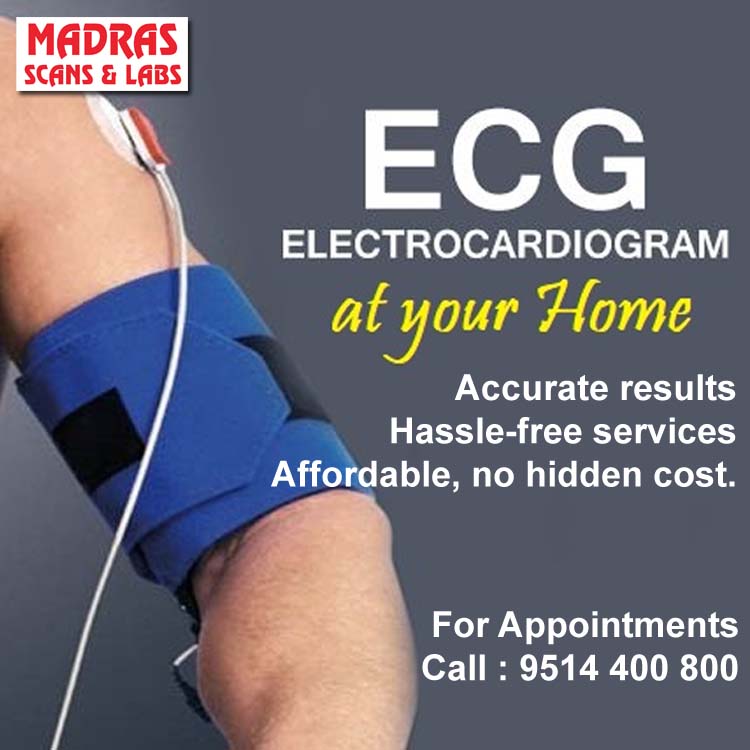



Madras Scan & Labs is the best who provides Digital X Ray Services at Home and Hospital. We also provides services for Portable X-Ray, Ultrasound, Echo, ECG , Blood Collection at Home and Centre. “Digital X-Ray , Ultrasound and Blood Test Services. Digital Portable X-Ray At Home. This service is for patient post surgical or not able come to hospital. We Go To Home And Take X-Ray And Blood Sample. At Home Service 24 x 7 All over Chennai.”
Portable X-ray services
Portable X-ray services refer to the provision of X-ray imaging technology in a mobile or portable unit that can be brought to various locations, such as hospitals, clinics, nursing homes, or even remote areas. This portable solution allows healthcare professionals to obtain high-quality diagnostic images without the need for patients to be transported to a dedicated radiology department.
The use of portable X-ray services offers several advantages in different healthcare settings. Here are some key points to consider:
Accessibility: Portable X-ray services improve accessibility to diagnostic imaging for patients who may have mobility issues, are critically ill, or reside in remote locations. It eliminates the need for patients to travel to a radiology department, which can be especially challenging for individuals with limited mobility or those requiring intensive care.
Convenience: By bringing X-ray technology to the patient’s bedside, healthcare professionals can streamline the diagnostic process, resulting in reduced waiting times and quicker access to results. This is particularly beneficial in emergency departments, intensive care units, and long-term care facilities where timely diagnosis is crucial.
Infection control: In healthcare settings, infections can spread easily, and mobility of patients can contribute to this risk. Portable X-ray services help minimize the movement of patients, thereby reducing the potential for cross-contamination and infection transmission. It also allows healthcare professionals to quickly isolate contagious patients, ensuring the safety of others.
Flexibility: Portable X-ray units are designed to be compact, lightweight, and maneuverable. They can be easily transported and set up in different locations as needed. This flexibility allows healthcare providers to adapt to changing patient needs and optimize resource allocation within a healthcare facility.
Emergency response: Portable X-ray services play a vital role in emergency situations, such as natural disasters or mass casualty incidents, where access to immediate medical imaging is critical. These services enable healthcare professionals to rapidly triage and diagnose patients on-site, facilitating prompt and appropriate medical interventions.
Follow-up care: For patients who require ongoing medical care or rehabilitation, portable X-ray services can be used to monitor progress and provide regular diagnostic imaging. This saves patients from the inconvenience of traveling to a radiology department, especially if they have limited mobility or chronic conditions that require frequent imaging.
It’s important to note that while portable X-ray services offer many benefits, they may have some limitations compared to fixed radiology departments. These limitations can include smaller image acquisition capabilities, reduced imaging options, and potential challenges in accommodating specialized procedures. However, advancements in technology continue to address these limitations, improving the overall capabilities of portable X-ray units.
Portable X-ray services provide a valuable solution for delivering diagnostic imaging in a wide range of healthcare settings. They enhance accessibility, convenience, infection control, flexibility, emergency response, and follow-up care. By bringing X-ray technology directly to the patient, portable X-ray services contribute to efficient and patient-centered healthcare delivery.
Portable ultrasound services
Portable ultrasound services refer to the provision of ultrasound imaging technology in a mobile or portable unit that can be transported to various locations, such as hospitals, clinics, community health centers, and even remote areas. This portable solution allows healthcare professionals to perform diagnostic ultrasound examinations without the need for patients to travel to a dedicated radiology department.
Portable ultrasound services offer several advantages and have become increasingly popular in healthcare settings. Here are some key points to consider:
Accessibility: Portable ultrasound services improve access to diagnostic imaging, particularly for patients who may have limited mobility, are in critical condition, or live in underserved areas. By bringing ultrasound technology to the patient’s location, healthcare professionals can provide timely and efficient diagnostic services without the need for patients to travel long distances.
Point-of-care use: Portable ultrasound units are designed for point-of-care use, enabling healthcare providers to perform real-time imaging and obtain immediate results at the patient’s bedside. This is particularly valuable in emergency departments, intensive care units, and other critical care settings, where quick and accurate diagnosis is crucial for immediate treatment decisions.
Efficiency: Portable ultrasound services streamline the diagnostic process by eliminating the need for patients to be transported to a radiology department or schedule separate appointments. This reduces waiting times, facilitates rapid assessment, and allows for faster treatment planning and intervention. It also enhances workflow efficiency and patient throughput in busy healthcare environments.
Versatility: Portable ultrasound units offer a wide range of imaging capabilities, allowing healthcare professionals to assess various anatomical areas and organ systems. They can be used for abdominal, cardiac, obstetric, musculoskeletal, vascular, and other specialized ultrasound examinations. Portable units often come with advanced imaging features, including color Doppler, 3D/4D imaging, and elastography, providing detailed and comprehensive diagnostic information.
Infection control: In healthcare settings, the risk of infection transmission is a significant concern. Portable ultrasound services minimize patient movement and reduce the potential for cross-contamination. By performing imaging at the patient’s location, healthcare professionals can maintain infection control measures more effectively, especially in isolation units or areas with contagious patients.
Outreach and remote areas: Portable ultrasound services play a crucial role in providing healthcare services to underserved populations or remote areas with limited access to medical facilities. They enable healthcare providers to perform diagnostic imaging and provide preliminary assessments in locations where establishing a permanent radiology department may not be feasible.
Follow-up care: Portable ultrasound services can be used for routine follow-up examinations and monitoring of chronic conditions. Patients with ongoing medical care or those receiving rehabilitation can benefit from the convenience of receiving ultrasound services at their healthcare facility or home, reducing the burden of travel and improving adherence to follow-up recommendations.
While portable ultrasound services offer numerous advantages, it’s important to note that they may have certain limitations compared to larger, stationary ultrasound systems. These limitations may include smaller display screens, fewer transducer options, and limited storage and networking capabilities. However, advancements in technology have led to significant improvements in portable ultrasound units, providing high-quality imaging and expanding their diagnostic capabilities.
Portable ECG (Electrocardiogram) services
Portable ECG (Electrocardiogram) services refer to the provision of ECG monitoring and testing through mobile or portable devices that can be used in various settings, including hospitals, clinics, ambulances, and even in the comfort of a patient’s home. These portable solutions allow healthcare professionals to perform ECG tests outside of traditional clinical settings, enabling convenient and timely diagnosis and monitoring of cardiac conditions.
Here are some key points to consider when discussing portable ECG services:
Accessibility and Convenience: Portable ECG services improve accessibility to cardiac diagnostics by bringing ECG testing directly to patients. This is particularly beneficial for individuals with limited mobility, elderly patients, or those who live in remote areas. The convenience of portable ECG devices allows for faster and easier testing, reducing the need for patients to travel to a hospital or specialized clinic.
Continuous Monitoring: Portable ECG devices often offer the capability of continuous monitoring, allowing healthcare professionals to capture and analyze a patient’s heart rhythm over an extended period. This is especially valuable for patients with suspected arrhythmias or those who experience intermittent symptoms. Continuous monitoring provides a more comprehensive picture of the heart’s electrical activity, enabling accurate diagnosis and personalized treatment plans.
Early Detection and Diagnosis: With portable ECG services, healthcare providers can detect and diagnose cardiac conditions at an earlier stage. By performing ECG tests outside of scheduled clinic visits, potential heart abnormalities can be identified promptly, facilitating timely intervention and preventing the progression of diseases. This is particularly crucial for patients with chronic cardiovascular conditions or individuals at risk of cardiac events.
Remote Monitoring: Portable ECG services allow for remote monitoring of patients’ cardiac health. Patients can use portable ECG devices at home and transmit the recorded data to healthcare professionals for analysis and interpretation. This remote monitoring capability is especially valuable for individuals who require long-term monitoring, postoperative care, or those with chronic conditions, as it provides a means for healthcare providers to track their cardiac health without frequent hospital visits.
Emergency Response: Portable ECG devices play a vital role in emergency medical situations. They are commonly used in ambulances and pre-hospital care to quickly assess a patient’s heart rhythm and make critical decisions regarding immediate treatment. Portable ECG services enable rapid identification of life-threatening conditions, such as ST-segment elevation myocardial infarction (STEMI), allowing for timely intervention and improved patient outcomes.
Telemedicine Integration: Portable ECG services can be seamlessly integrated into telemedicine platforms, enabling remote consultations and real-time collaboration between healthcare providers and patients. By transmitting ECG data electronically, healthcare professionals can review and interpret the results remotely, providing timely advice and making informed treatment recommendations. Telemedicine integration enhances accessibility to specialized cardiac care, particularly for patients in rural or underserved areas.
Patient Empowerment: Portable ECG services empower patients to take an active role in managing their cardiac health. With portable devices, patients can perform self-monitoring, track their heart rhythm over time, and share the data with their healthcare providers. This promotes patient engagement, education, and adherence to treatment plans, leading to improved overall cardiac health outcomes.
In summary, portable ECG services offer numerous benefits in the field of cardiac diagnostics and monitoring. They enhance accessibility, convenience, and early detection of cardiac conditions. These services facilitate continuous monitoring and remote patient management, contribute to emergency response, integrate well with telemedicine platforms, and empower patients to actively participate in their cardiac care. Portable ECG services are instrumental in improving patient outcomes and ensuring effective cardiac healthcare delivery.
